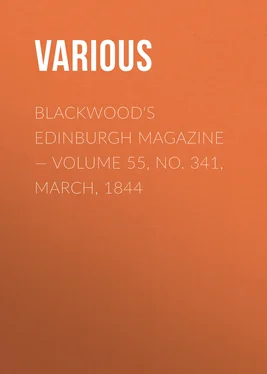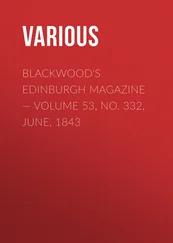Various - Blackwoods Edinburgh Magazine – Volume 55, No. 341, March, 1844
Здесь есть возможность читать онлайн «Various - Blackwoods Edinburgh Magazine – Volume 55, No. 341, March, 1844» — ознакомительный отрывок электронной книги совершенно бесплатно, а после прочтения отрывка купить полную версию. В некоторых случаях можно слушать аудио, скачать через торрент в формате fb2 и присутствует краткое содержание. Жанр: foreign_antique, periodic, foreign_edu, на английском языке. Описание произведения, (предисловие) а так же отзывы посетителей доступны на портале библиотеки ЛибКат.
- Название:Blackwoods Edinburgh Magazine – Volume 55, No. 341, March, 1844
- Автор:
- Жанр:
- Год:неизвестен
- ISBN:нет данных
- Рейтинг книги:5 / 5. Голосов: 1
-
Избранное:Добавить в избранное
- Отзывы:
-
Ваша оценка:
- 100
- 1
- 2
- 3
- 4
- 5
Blackwoods Edinburgh Magazine – Volume 55, No. 341, March, 1844: краткое содержание, описание и аннотация
Предлагаем к чтению аннотацию, описание, краткое содержание или предисловие (зависит от того, что написал сам автор книги «Blackwoods Edinburgh Magazine – Volume 55, No. 341, March, 1844»). Если вы не нашли необходимую информацию о книге — напишите в комментариях, мы постараемся отыскать её.
Blackwoods Edinburgh Magazine – Volume 55, No. 341, March, 1844 — читать онлайн ознакомительный отрывок
Ниже представлен текст книги, разбитый по страницам. Система сохранения места последней прочитанной страницы, позволяет с удобством читать онлайн бесплатно книгу «Blackwoods Edinburgh Magazine – Volume 55, No. 341, March, 1844», без необходимости каждый раз заново искать на чём Вы остановились. Поставьте закладку, и сможете в любой момент перейти на страницу, на которой закончили чтение.
Интервал:
Закладка:
Thus much in proof, that the boss of pirouettiveness is strangely wanting in human conformation, and that there is consequently all the excuse of ignorance for the wild enthusiasm lavished by London on the operative class. Ten guineas per night—five hundred for the season—is the price exacted for a first-rate opera-box; and as the exclusives usually arrive at the close of the opera, or, if earlier, keep up a perpetual babble during its performance, they clearly come for the dancing.—" On voit l'opéra, et l'on écoute le ballet ," used to be said of the Académie de Musique. But it might be asserted now, with fully as much truth, of the Queen's Theatre, where the evolutions of Carlotta Grisi, Elssler, and Cerito, keep the audience in a state of breathless attention denied to Shakspeare.
In two out of these instances, it may be advanced that they are consummate actresses as well as graceful and active dancers. Elssler's comedy is almost as piquant as that of Mademoiselle Mars. Nor is the ballet unsusceptible of a still higher order of histrionic display. We never remember to have seen a stronger levée en masse of cambric handkerchiefs in honour of O'Neill's Mrs Haller , or Siddons's Isabella , than of the ballet of "Nina;" while the affecting death-dance in "Masaniello" is still fresh in the memory of the admirers of Pauline Leroux. We have heard of swoons and hysterics along the more impressionable audiences of La Scala, during the performance of the ballet of "La Vestale;" and have witnessed with admiration the striking effect of the fascinative scene in "Faust."
Of late years, the union of Italian blood and a French education has been found indispensable to create a danseuse —"Sangue Napolitano in scuola Parigiana;"—and Vesuvius is the Olympus of all our recent divinities. Formerly, a Spanish origin was the most successful. The first dancer who possessed herself of European notoriety was La Camargo, whose portraits, at the close of a century, are still popular in France, where she has been made the heroine of several recent dramas. To her reign, succeeded that of the Gruinards and Duthés—in honour of whose bright eyes, a variety of noblemen saw the inside both of Fort St Evêque and St Pelagie; the opera being at that time a fertile source of lettres de cachet . To obtain admittance to the private theatricals of the former dancer, in her magnificent hotel in the Chaussée d'Antin, the ladies of fashion and of the court had recourse to the meanest artifices; while the latter has obtained historical renown, by having excited the jealousy, or rather envy, of Marie Antoinette. Mademoiselle Duthé appeared at the fêtes of Longchamps, in the Bois de Boulogne, in a gorgeous chariot drawn by six milk-white steeds, with red morocco harness, richly ornamented with cut steel; and thus accomplished the object of incurring the resentment of the court, from the prodigality of one of whose married princes these splendours were supposed to emanate—splendours exceeding those of the Rhodopes of old.
But the greatest triumph ever achieved by danseuse , was that of Bigottini! The Allied sovereigns, after vanquishing the victor of modern Europe, were by her vanquished in their turn. At her feet, fresh trembling from an entre-chat , did
"Fiery French and furious Hun"
lay down their arms! The Allied armies appeared to have entered Paris only to become the slaves of Bigottini!
In our own country, devotees of the danseuse have done more, by promoting her to the decencies of the domestic fireside. In our own country, also, even Punch was once purchased by an eccentric nobleman for the diversion of his private life. But as Demosthenes observed of the cost of such a pleasure, "that is buying repentance too dear!"
We are perhaps offending the gravity of certain of our readers by the extent of this notice; albeit, we have striven to propitiate their prejudices by the peculiar combination and juxtaposition of professions, selected for consideration. But we are not acting unadvisedly. Close its eyes as it may, the public cannot but perceive, that the legitimate drama is banished by want of encouragement from the national theatres, and that the ballet is brandishing her cap and bells triumphantly in its room.
Such changes are never the result of accident. The supply is created by the demand. It is because we prefer the Sylphide to Juliet, that the Sylphide figures before us. Shakspeare was played to empty benches; the Peri and Gisele fill the houses.
We repeat, therefore, since such is the bent of public appetite, let it be gratified in the least objectionable way. Let us have a royal academy of dancing. We shall easily find some Earl of Westmoreland to compose its ballets, and lady patronesses to give an annual ball for the benefit of the institution. Do not let some eighty thousand a-year be lost to the country. An idol is as easily carved out of one block of wood as another. Let us make unto ourselves goddesses out of the haberdashers' shops of Oxford Street; and qualify the youthful caprices of Whitechapel to command the homage of Congress, and of the great autocrat of all the Russias. Properly instructed, little Sukey Smith may still obtain an enameled brooch or bracelet from her Majesty the Queen-Dowager! Let us "people this whole isle with sylphs!" Let Drury-Lane and Covent-Garden flourish; but—thanks to Great Britain pirouettes!—the art of giving ten guineas for a couple of hours spent in an opera-box, will then become less criminal; and we shall have no fear of the influence of some Herodias's daughter in our domestic life, when we see the Cracovienne announced in the bills "by Miss Mary Thomson." The charm will be destroyed. The unfrequented coulisses , like Dodona, will cease to give forth oracles.
Under the influence of an "establishment," we shall have to record of opera-dancers as of other professions, that "the goddesses are departing!" The danse à roulades of Fanny Elssler will be voted vulgar, when attempted by a Buggins. Let Mr Bunn look to himself. He may yet survive his immortality. We foresee a day in which he will be no longer styled Alfred the Great. With the aid of George Robins, and other illustrious persons interested in the destinies of theatrical property, we do not despond of hearing attached to "a bill for the legalization of the Royal and National Academy of Dancing of the United Kingdom," the satisfactory decree of "LA REINE LE VEUT!"
THE PIRATES OF SEGNA
A TALE OF VENICE AND THE ADRIATIC. IN TWO PARTS.
PART I
CHAPTER I.—THE STUDIO
It was on a bright afternoon in spring, and very near the close of the sixteenth century, that a handsome youth, of slender form and patrician aspect, was seated and drawing before an easel in the studio of the aged cavaliere Giovanni Contarini—the last able and distinguished painter of the long-declining school of Titian. The studio was a spacious and lofty saloon, commanding a cheerful view over the grand canal. Full curtains of crimson damask partially shrouded the lofty windows, intercepting the superabundant light, and diffusing tints resembling the ruddy, soft, and melancholy hues of autumnal foliage; while these hues were further deepened by a richly carved ceiling of ebony, which, not reflecting but absorbing light, allayed the sunny radiance beneath, and imparted a sombre yet brilliant effect to the pictured walls, and glossy draperies, of the spacious apartment. Above the rich and lofty mantelpiece hung one of the last portraits of himself painted by the venerable Titian, and on the dark pannels around were suspended portraits of great men and lovely women by the gifted hands of Giorgione, Paul Veronese, Paris Bordone, and Tintoretto. Regardless, however, of all around him, and almost breathless with eagerness and impatience, the student pursued his object, and with rapid and vigorous strokes had half completed his sketch—totally unconcious the while that some one had opened the folding-doors, crossed the saloon, and now stood behind his chair.
Читать дальшеИнтервал:
Закладка:
Похожие книги на «Blackwoods Edinburgh Magazine – Volume 55, No. 341, March, 1844»
Представляем Вашему вниманию похожие книги на «Blackwoods Edinburgh Magazine – Volume 55, No. 341, March, 1844» списком для выбора. Мы отобрали схожую по названию и смыслу литературу в надежде предоставить читателям больше вариантов отыскать новые, интересные, ещё непрочитанные произведения.
Обсуждение, отзывы о книге «Blackwoods Edinburgh Magazine – Volume 55, No. 341, March, 1844» и просто собственные мнения читателей. Оставьте ваши комментарии, напишите, что Вы думаете о произведении, его смысле или главных героях. Укажите что конкретно понравилось, а что нет, и почему Вы так считаете.












